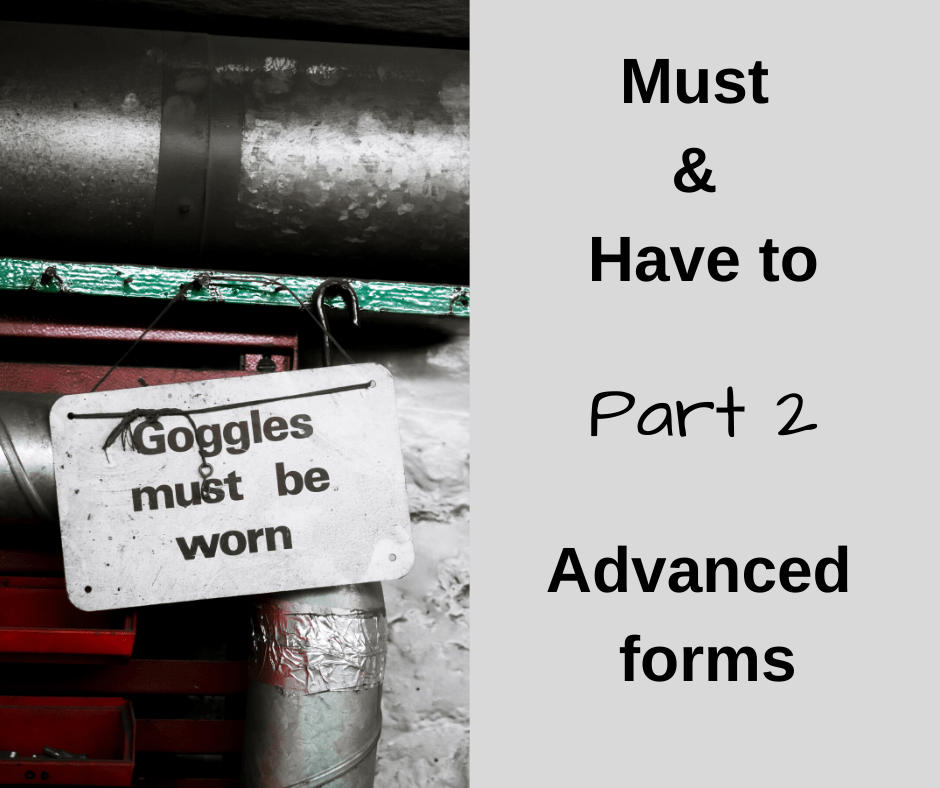
Learn some advances forms and uses of MUST and HAVE TO in this grammar episode.
ITALKI https://go.italki.com/aprenderingles
“Get $10 USD in italki Credits with your first purchase”
Must and Have to – Part 1: The basics – inglespodcast.com/301
We can use have to/must to speak about deductions and speculations as well as obligation, for past, present and future time.
You must be mad!
He must be joking!
She’ll have to get a visa to visit India.
I had to admit I was wrong.
We didn’t have to ask for special permission to use our mobiles in that museum.
There must be some mistake.
You’re going to have to pay for that cup you broke in the shop.
I’ve had to apologise many times in my life.
We’ve recorded 3 podcasts. It must be coffee time.
Remember that modal verbs like “must” just invert without another auxiliary for question forms, and just add “not” in negatives.
Must we go now? We’re having so much fun!
Must the teacher give homework every day?
You must not/mustn’t mention this to anyone – it’s a secret. Pron. /musint/
The runner must be tired, mustn’t he?
“Have to” uses auxiliary verbs as it’s a semi-modal verb. “Must” isn’t possible below:
She’ll have to get a visa to visit India.
We didn’t have to ask for special permission to use our mobiles in that museum.
I’ve had to apologise many times in my life.
Did you really have to do that?
Wouldn’t you have to sign a form to collect the driving license?
To speak about probability/deduction/obligation in the past, we can use must and the perfect infinitive without to ‘have + PAST PARTICIPLE’.
He must have/must’ve arrived early. /mustuv/ pron.
I’ve missed my bus – look at the time!. I must’ve fallen asleep.
Must Peter have taken my coat by mistake? He’s gone but his coat’s still here.
Why hasn’t Sally arrived yet? She mustn’t have seen my Whatsapp message.
This table’s filthy! It mustn’t have been cleaned this morning.
Perfect – he must have known (past). He must know (now – present)
They must be on the plane (now) – present. They must’ve been on the plane (yesterday) – past
Continuous infinitive without to “be + ___ing” indicates an action in progress.
I can hear the TV next door. The neighbour must be watching TV at the moment.
They mustn’t be enjoying themselves because they aren’t smiling much.
I must be getting old – I keep forgetting what I have to do every day.
Perfect continuous infinitive without to “must have been + ___ing” indicates an action in progress in the past – eg. must have been watching…
I could hear the TV next door last night. The neighbour must have been watching TV then..
They mustn’t have been enjoying themselves because they weren’t smiling much.
Must the driver have been texting at the time of the crash? He left a message unfinished.
Look at the awful dress! She mustn’t have been wearing her glasses when she bought it!
Have to / got to – pron. Gotta go – you’ve gotta
And, unfortunately, we’ve gotta go now. Thanks for listening!
…and now it’s your turn to practise your English.
Send us a voice message. https://www.speakpipe.com/inglespodcast
Send us an email with a comment or question to [email protected] or [email protected].
Visit our online store: https://store.mansioningles.net/
Thank you to all of you who are helping us by supporting this podcast. You can see a list of all our Patreon supporters at Patreon.com/inglespodcast
Welcome to our new Patreon supporters who have joined us this month:
Roberto Rossi
Mercedes Fernandez
Daniel Alejandro Alessod Pavez
Blas López
Marisa
Manuel Martinez
Camilo Meza
Join our Patreon program for as little as $1 per month and you get instant access to recent transcriptions. https://www.patreon.com/inglespodcast
On next week’s episode: Gambling Vocabulary and Idioms
The music in this podcast is by Pitx. The track is called ‘See You Later’
Picking fingers by Stefan Kartenberg (c) copyright 2019 Licensed under a Creative Commons Attribution Noncommercial (3.0) license. http://dig.ccmixter.org/files/JeffSpeed68/59513 Ft: unreal_dm



